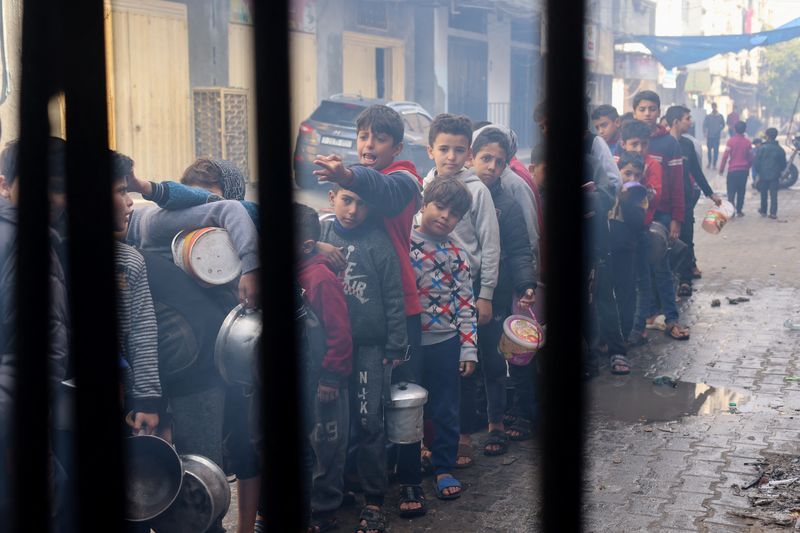By Nidal al-Mughrabi
CAIRO (Reuters) - People in Gaza described begging for bread, paying 50 times more than usual for a single can of beans and slaughtering a donkey to feed a family as food aid trucks were unable to reach most parts of the bombarded Palestinian territory.
Israel was pounding the length of the Gaza Strip in pursuit of its goal of destroying Hamas, the conflict making it almost impossible for aid convoys to move around and reach people going hungry.
The U.N. humanitarian office OCHA said on Thursday that limited aid distributions were taking place in the Rafah area, close to the border with Egypt, where almost half of Gaza's population of 2.3 million is now estimated to be living.
"In the rest of the Gaza Strip, aid distribution has largely stopped, due to the intensity of hostilities and restrictions on movement along the main roads," it said.
"Aid? What aid? We hear about it and we don't see it," said Abdel-Aziz Mohammad, 55, displaced from Gaza City and sheltering with his family and three others, about 30 people in total, at the house of friends who live further south.
"I used to have a big house, two fridges full of food, electricity and mineral water. After two months of this war, I am begging for some loaves of bread," he said by telephone.
"It is a war of starvation. They (Israel) forced us out of our homes, they destroyed our homes and businesses and drove us to the south where we can either die under their bombs or die of hunger."
The head of the U.N. agency for Palestinian refugees, UNRWA, said on Thursday hungry people were stopping its aid trucks to take food and eat it straight away.
In northern Gaza, which bore the brunt of Israel's military offensive during the first phase of the war, between Oct. 7 and the start of a truce on Nov. 24, intense combat has resumed and barely any aid has got through since the truce ended on Dec. 1.
Youssef Fares, a journalist from Jabalia in the north, said staple goods like flour were now so hard to find that prices had gone up by 50 to 100 times compared with before the war.
NORTH CUT OFF
"This morning I went in search of a loaf of bread and I couldn't find it. What is left in the market is candy for children and some cans of beans, which have gone up 50 times in price," he wrote in a diary entry posted on Facebook (NASDAQ:META).
"I saw someone who slaughtered a donkey to feed it to hundreds of his family members," he said.
All aid trucks are entering Gaza through the Rafah border crossing with Egypt, but first they have to be inspected by Israel. Since deliveries began on Oct. 20, inspections have been taking place at the Nitzana crossing between Israel and Egypt, forcing trucks to loop from Rafah to Nitzana and back, causing bottlenecks.
Since Wednesday, Israel has begun additional inspections at another location, the Kerem Shalom crossing between Israel and Gaza, which aid officials said should reduce bottlenecks.
U.N. officials said 152 aid trucks had entered Gaza on Wednesday, up from about 100 a day previously, but this was only a fraction of what was needed to address the humanitarian catastrophe unfolding in Gaza.
They called on Israel to let trucks directly into Gaza through Kerem Shalom rather than make them go back to Rafah.
A senior U.N. official with detailed knowledge of the aid delivery issue said Israel could make a significant difference by letting trucks through Kerem Shalom, but was choosing not to.
"It's not a breakthrough in any way since they return them back to Rafah ... It's another bluff," the official said.

Israel started its campaign to destroy the Hamas militant group that controls Gaza after its fighters stormed across the border fence into southern Israel on Oct. 7, killing 1,200 people, including babies and children, and seizing 240 hostages of all ages.
Since then, Israel's bombardment and siege have killed more than 18,000 people, mostly women and children, according to Palestinian health authorities, and have laid waste to much of the territory, displacing most of its population.